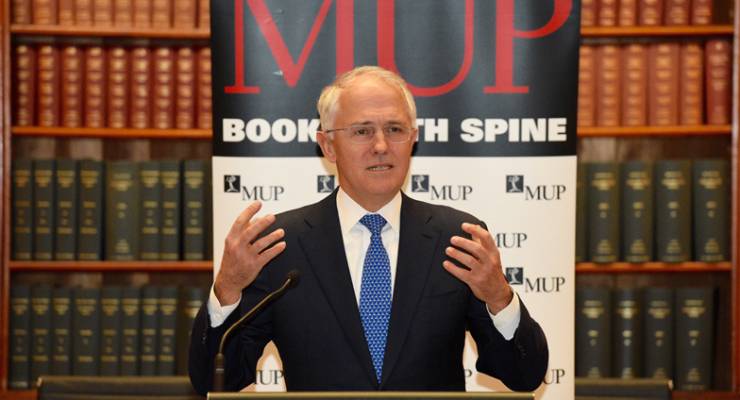
If the Prime Minister wanted to quell concerns that he’s been captured by the hard right of his party, launching Chris Mitchell’s autobiography was probably not wise. Up till recently, Turnbull and Mitchell, the former editor of The Australian, would have seemed to have a few major differences. But with George Christensen being labelled “the acting prime minister”, if Malcolm Turnbull wants to win over new voters, then he could stop hanging around with the old, white men of News Corp.
Anyway, it was a noticeably slimmer Turnbull who turned up at NSW Parliament House on Friday morning to launch Making Headlines, Mitchell’s memories of 42 years in journalism (all at News Ltd/News Corp).
He seemed conscious of the issue, saying in his opening remarks that he “wasn’t going to get into the very frank assessments in the book about some of my predecessors”. (The book has been widely criticised for revealing private conversations with Kevin Rudd and other politicians.)
“It’s better that it’s Chris Mitchell making the headlines today, not me … and his views are very much worth heeding. He came to newspapers when he was 17 and left his job at the very premature age of 60.” That, to an older audience, got not a single laugh.
From there, Turnbull retreated to familiar territory — working as a journalist when he was at law school. We even got to hear the story (again) about him being offered a job by Harold Evans, the legendary former editor of The Times.
From there, we were onto another familiar topic — technology — although “innovation”, luckily, seems to have been retired.
“Over the years, journalism is being remoulded by technology. Chris offers some very keen insights into disruption of new media platforms on the industry. The frustrating thing for journalists is that there are more people reading your copy than ever before, and yet the revenue is not there.”
He also referred to the recent UN Leaders summit in New York, where there was a lot of discussion about “post-truth politics”. A great deal of political discourse has become “disconnected from reality,” Turnbull said, and even though the media calls it out, most people only listen to media that reinforces their prejudices.
“Increasingly, when we move into a world of narrow-casting, we run the risk that people get the news that they want,” rather than something that challenges their analysis, the PM said.
Then back to the book: the PM said that that although it would “annoy and irritate so many people, what comes out of it is a real love and passion for newspapers”. He said he was “deeply touched by the passion that you show. You’re a tough guy, a strong leader, you also have a very big heart and a great love for this industry. As a young man, I remember being entranced by the noise of the presses of a newspaper and the excitement of late breaking news. It’s a wonderful, romantic business.”
Turnbull also refers to the “great eccentrics” who populate newspapers, but “not at The Australian,” of course. (That did get a laugh).
Finally, the author got to the lectern, thanking (rival gossip columnists) Joe Aston and Bryce Corbett for publicising the book and then repeating a tweet by journalist Caroline Overington saying that the book was “Pervy, amusing and the ultimate love-letter to journalism”.
In the spirit of continuous disclosure — why stop now? — Mitchell said that Turnbull had read the book and given him feedback two weeks before it was published.
Then, oddly, the ex-editor said that he had “hacked no phones” but had transcribed some of his text messages. And in a reference to claims surrounding News Corp sports editor Phil Rothfield, he said: “I took no money from any match-fixing brothel owners. I did not not kick down or kiss up.” He then got on to one of his favourite topics, the evils of Twitter, and said that the task of political reform would be improved if “more people read Paul Kelly than Twitter”.
In the book Mitchell says that he had deliberately positioned The Australian towards the baby boomers, and they were well represented at the launch. From News Corp, Twitter-alternative Paul Kelly, Dennis Shanahan, Hedley Thomas and Judith Sloan turned up, as did Paul Whittaker and Piers Akerman. Former News Corp CEO Peter Tonagh was there, as was former Australian editor Clive Mathieson. At the civilian end of the room was former NSW Chief Justice Jim Spigelman, businessman Dick Smith and former Wallabies captain John Eales.
In the book, Mitchell said that he wanted to give people “a chance to see how the relationship between government and the media operates”. But, to quote Otto von Bismarck, if you show people how the sausage is made, they might not want to buy the sausage. Casually laying bare the many unethical and conflicted practices that lie at the heart of this often pathological relationship has not won Mitchell any favours, particularly among people called Murdoch. But revealing private conversations with Rupert and Lachlan and a raft of senior politicians is damaging to all journalists, not just himself. The blowback on this has been so serious that News Corp executive chairman Michael Miller last week sent a memo saying that “promises of confidentiality to a source must, of course, be honoured”.
The part in the book where Mitchell casually quotes then PM Kevin Rudd asking him to “think about whether there were a change — particularly to the proposed individual contract reforms — that the paper would find acceptable” is horrendous. We all knew that News had Rudd by the short and curlies, but did he have to put it in a book? And is the PM’s office now sending proposed legislation to Boris Whittaker, asking him for suggestions? Two weeks ago, if anyone had suggested it to me, I would have said they were on crack. Now, well …
This is the sort of information that drives voters away from the major parties into the arms of people like Nick Xenophon and Pauline Hanson, who campaign relentlessly on the fact that “we are not like them”.
And it’s a small quibble, but did he really have to thank his partner’s daughter, journalist Gina Rushton, for “typing his manuscript”? Isn’t that like admitting you wear spats?
Mitchell’s revelations have even upset former mate Tony Abbott.
Recently, he said, “When you have the former editor-in-chief of The Australian gleefully relating conversations which everyone must have understood were off the record, something is going wrong …”
“There is a trust deficit not just in politics, but in society. Generally, there is an honour deficit, not just in politics but in society generally.” Unusually, Abbott is right.








Mitchell has done us an enormous favour. Those few people who hadn’t realised what a dirty, lying, trivial, amoral and self-serving con the ‘profession’ of journalism has become are now in no doubt. The smugness, the insufferable self-importance, the condescension, the schoolyard vindictiveness and pettiness…the very worst of our society are in complete epistemological control of our public conversations.
Don’t need journalism if this is what journalism is become. Let the industry die into extinction, quickly and with minimal fuss. It will not be mourned.
Extreme right propagandist praised by Turnbull … is that newsworthy…?
sick, (fully.)
News flash – Journalism is tawdry, amoral, unethical, untrustworthy and meretricious – who knew, apart from all those people who no longer buy news papers or trust the spin & churnalists?